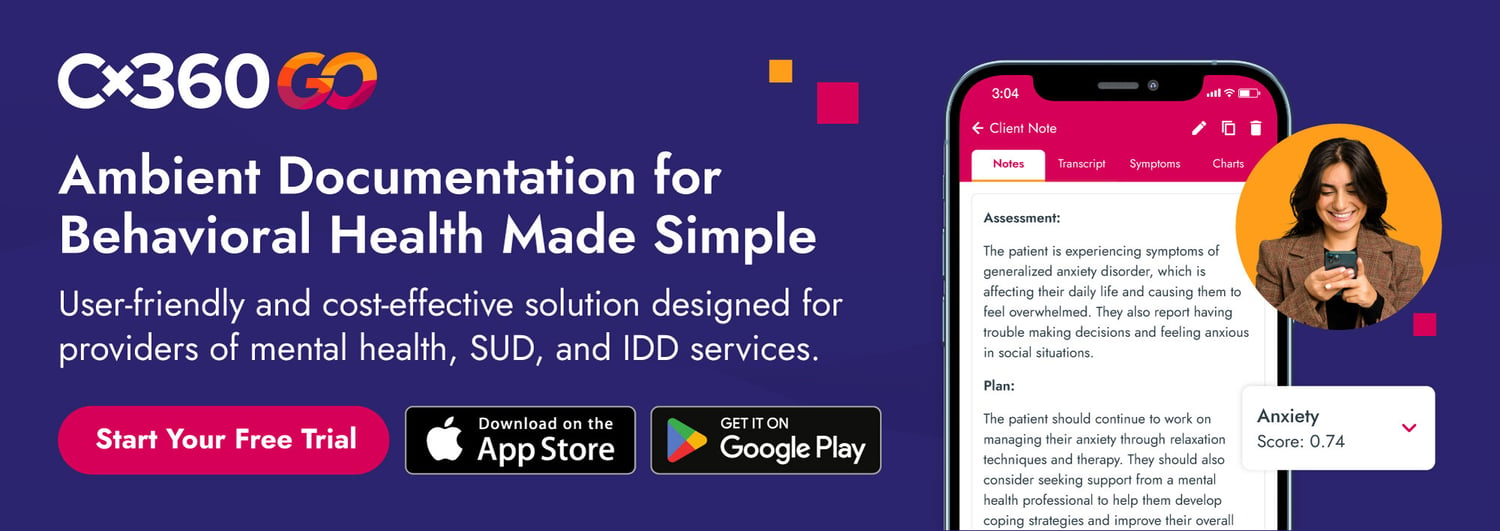Healthcare and AI: Overcoming Stigmas in Behavioral Health
by Mike Lardieri, LCSW on March 26, 2024

Every day, millions of people around the world are impacted by health conditions that fall into three categories of behavioral health: mental health, substance use disorders, and intellectual or developmental disabilities (IDD).
Yet, compared to other healthcare areas, these three categories are also subject to some of the most intense stigmatization.
The result?
Millions of clients avoiding, being left out of, or otherwise not receiving the care they need for fear of breaking social taboos.
But with more technologies like artificial intelligence (AI) increasingly at providers’ fingertips, options for mitigating stigma are multiplying. Here’s a look at the future of healthcare and AI, and how innovative technologies are helping ensure shame has no place in behavioral healthcare.
The State of Stigma in Healthcare
In recent years there’s been an alarming increase in mental health conditions and substance use, forcing the world to have more transparent conversations around these issues. In 2022, for example, 90% of U.S. adults reported feeling like the country was in a mental health crisis. In that same year, the number of drug overdoses increased fivefold from 2002 to a staggering 105,452. Then, in 2023, ECRI declared the pediatric mental health crisis as its most pressing patient safety threat.
Though schools, government leaders, and families have started paying more attention to behavioral health concerns, stigmas around these conditions persist.
Let’s be clear: Mental health conditions, IDD, and substance use disorders are not shameful. But the idea that they are leads many to receive poor quality care or no care at all. One study, for example, found that people who used injected drugs often felt dehumanized and discriminated against in healthcare settings. The fear of this treatment led about 10% of people with substance use disorders in 2021 to avoid seeking care altogether.
Similarly, people with IDD have lower rates of preventative screening and often experience difficulties with belonging and connection due to stigma and discrimination. Meanwhile, medical publications like The Lancet call mental health stigma a true “health crisis.”
Something has to change. And behavioral healthcare providers have a growing number of tools at their disposal to drive that change.
AI Use Cases in Healthcare
Reducing stigma around behavioral health starts with ensuring that individuals feel seen, empowering them to participate in their own care journeys, and supporting them through challenging times when social or internalized self-stigma make sharing information too difficult or overwhelming. For behavioral health providers, reducing stigma requires strengthening communication, engaging clients, and improving their agency at every step — and AI is already helping in each of these areas.
HRSN Tracking, Chatbots, AI Mental Health Apps, and Peer Support
Client engagement and empowerment requires meaningful interactions with providers, and healthcare and AI technology tailored to individual needs can help move the needle here. That’s why behavioral health providers are investing in AI technology that places personalized care at the forefront, such as solutions for better population health management and apps that support and supplement care.
For example, Core Solutions’ AI-powered tools can identify and track health-related social needs (HRSN). This allows organizations to identify needs earlier in treatment and make information available to providers at the point of care about environmental and other factors that influence their client’s mental and/or physical health and development. This paves the way for more productive and open conversations that can help destigmatize issues people may be facing like poverty, poor housing conditions, or low education quality.
Outside facility walls and in the comfort of their own home, individuals can explore without judgment or fear the concerns they may have about potential disorders using AI mental health apps and chatbots. These tools can provide education that helps dispel hurtful myths about behavioral health and offer a low barrier to entry for exploring forms of evidence-based treatment like cognitive behavioral therapy.
Other AI solutions provide something everyone experiencing stigma needs: peer support. Many, for example, use AI algorithms to match people experiencing substance use disorders with others facing similar challenges who can help them on the road to recovery.
Ultimately, these technologies provide people in need of support for behavioral health disorders with the hands-on coaching and resources they need to overcome stigmas and feel empowered to seek help.
Machine Learning, Healthcare, and AI Algorithms
Even after receiving care, mental health, substance use disorder, and IDD clients can still struggle with self-stigma that slows the pace of care and/or recovery. This is where machine learning can help. Machine learning is an essential feature in healthcare and AI technologies that enables them to quickly analyze massive datasets, identify patterns, and create self-learning models that can classify information, predict outcomes, and perform tasks without human intervention. One example of such a solution is Core Solutions’ Symptom and Diagnosis Tracker, which scans provider and other caregiver notes to identify symptoms and then connect those symptoms to potential associated diagnoses.
With this ability, machine learning can help predict behaviors and condition progression for people with mental health disorders, substance use disorders, or IDD, and screen for conditions like depression that carry stigma. We know that stigma can prevent people from truthfully answering subjective questions that inform a diagnosis or treatment plan, so findings from the use of machine learning have the potential to help clinicians proactively provide better quality care.
Such machine learning AI use cases in healthcare are increasing in number:
- One research team used machine learning to analyze electronic health records (EHRs) from more than 5,000 mental health clients. The algorithm had an 84% success rate at predicting whether a client would attempt self-harm within one week.
- Another machine-learning program examined speech patterns in clients with schizophrenia, with an 83% accuracy rate of predicting when psychosis would set in.
- To understand how applied behavior analysis (ABA) therapy impacted children with autism, researchers employed machine learning algorithms that classified, organized, and analyzed data from these clients.
- One machine-learning program was even able to predict severe psychological distress more accurately than a team of psychiatrists.
By analyzing large datasets at speed, machine learning is not only enabling better support for behavioral healthcare, but also arming providers with more detailed information they can distribute to help normalize these conditions and reduce stigma.
Finding the Right AI for Reducing Stigma
AI carries significant potential for reducing stigma and ensuring more people with behavioral health conditions get the care they deserve. When researching AI tools to consider adopting, providers will want to ensure they understand the extent to which the technology is designed with these concerns in mind. Questions to ask a behavioral health AI vendor under consideration include:
-
Has the AI algorithm undergone rigorous testing for bias and fairness to prevent discriminatory outcomes?
-
In what ways does the platform prioritize confidentiality and data privacy?
-
How does the AI handle differences in language and communication?
-
Does the AI facilitate access to care and resources?
Analyzing the answers to these questions can help providers determine which healthcare and AI-powered solutions can best assist their clients in overcoming stigma and feeling more empowered in care settings.
Core Solutions’ Cx360 platform and AI tools are helping providers everywhere deliver better patient-centric care and outcomes through applications like HRSN tracking, symptom and diagnosis tracking, and anomaly detection. Contact us today to learn more.
- Behavioral Health (38)
- EHR (22)
- AI in Healthcare (17)
- I/DD (16)
- Mental Health (14)
- Revenue Cycle Management (12)
- CCBHC (11)
- Electronic Health Records (9)
- Crisis Center (8)
- COVID-19 (4)
- Substance Abuse (3)
- Augmented Intelligence (2)
- Care Coordination (2)
- Addiction Treatment Software (1)
- Billing (1)
- Checklist (1)
- Substance Use (1)
- Telebehavioral Health (1)


